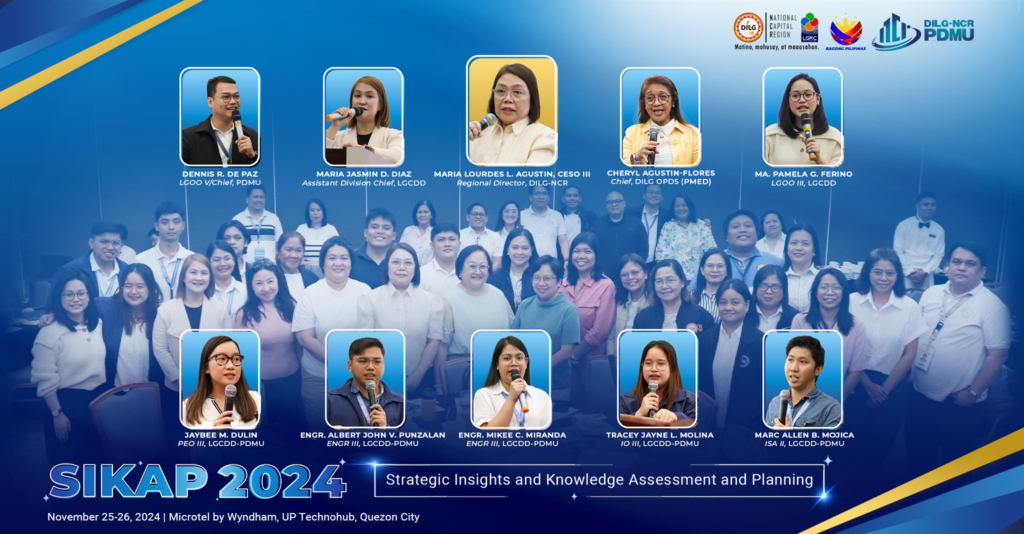
The Project Development and Management Unit (PDMU) of the Department of the Interior and Local Government – National Capital Region (DILG-NCR) capped off the year with the conduct of the Strategic Insights and Knowledge Assessment and Planning or SIKAP 2024 on November 25-26, 2024 at Microtel by Wyndham, UP Technohub, Quezon City. The activity was attended by DILG-NCR Field Officers, including Cluster Heads and Local Government Support Fund (LGSF) and Results-Based Monitoring and Evaluation (RBME) of Local Infrastructure Projects (RLIP) Focal Persons.
With the aim of intensifying the monitoring and evaluation of locally-funded projects in NCR and fostering a stronger sense of accountability among beneficiary LGUs in the implementation of these projects, SIKAP 2024 served as a platform to conduct a comprehensive analysis of LGU performance data for FY 2024, identifying strengths, weaknesses, and trends to inform future strategies.
DILG-NCR Regional Director Maria Lourdes L. Agustin, CESO III commenced the activity by commending the Field Officers for their shared efforts in monitoring their respective LGU’s projects, encouraging them to work collectively in setting efficient mechanisms tailored to the LGU’s dynamics.
“The purpose of the session is not only to assess where we stand [on LGU project monitoring], but also to come together and strategize for the future… We need to engage in open dialogue to understand the root causes of our challenges and work collaboratively to propose solutions,” RD Agustin stated.
Shortly after, LGOO III Ma. Pamela G. Ferino provided an overview of the activity, including the defining strategies of PDMU-NCR’s M&E performance, linkages to LGUs, capacity development initiatives, and established partnerships that shape the unit’s best practices toward organizational efficiency.
PDMU Chief LGOO V Dennis R. de Paz also reported on the status of all LGSF and RLIP projects. He discussed the challenges encountered in the monitoring of these projects, alongside the resolutions set by concerned LGUs in addressing the targets to complete throughout the fiscal year.
Technical officers Engineer III Mikee C. Miranda, Information Officer III Tracey Jayne L. Molina, and Project Evaluation Officer III Jaybee M. Dulin then facilitated the sharing of best practices on project monitoring, showcasing of documentation initiatives and excerpts from the 2024 Coffee Table Book, and the streamlining of M&E strategies and operations in the NCR, respectively.
Cheryl Agustin-Flores, Chief of the Project Monitoring and Evaluation Division (PMED) of DILG Office of Project Development Services (OPDS), focused her discussion on the legal basis and existing guidelines of RBME, as well as its importance in project implementation. She also delved into the use of the Regional Project Monitoring and Evaluation System (RPMES), highlighting M&E tools as an important component of a systematic completion process for locally-funded projects.
During the second day, Information Systems Analyst II Marc Allen B. Mojica and Engineer III Albert John V. Punzalan presented the matrix of this year’s SubayBAYANI Awards–the Department’s recognition of the noteworthy harvest of good practice, excellence, and innovation in the governance of local infrastructure projects–and the experiences of select LGUs in undergoing validation for the said award.
Through an audio-visual presentation, the PDMU-NCR also presented its year-end report and accomplishments for FY 2024, showing the progress on the region’s performance rating, outcomes of the stringent project M&E initiatives, concluded capacity development activities, and knowledge products produced.
The training needs analysis (TNA) and roundtable discussion for AGSIKAP 2025 capacity development priorities, as facilitated by LGOO III Ferino and PDMU Technical Officers, gathered significant feedback from the Field Officers, specifically on the target areas that need to be prioritized for the next fiscal year. Parallel to this, initial plans for the execution of FY 2025 programs were developed to adapt to the complexity of projects lodged to the LGUs, including those under the Green, Green, Green Program (G3P). These include branching out technical expertise, exploring benchmarking opportunities, offering capacity development interventions to a wide range of LGU functionaries, and conducting crash courses on the fundamentals of project implementation and M&E.
The PDMU-NCR remains committed to strengthening collaboration with the DILG-NCR Field Offices, conducting frequent personalized coaching and monitoring sessions with beneficiary LGUs, and holding systematic monthly documentations to facilitate the effective implementation of locally-funded projects in the region.
